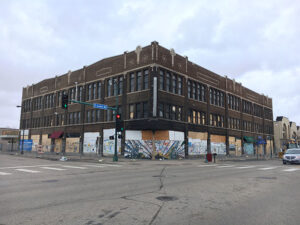
The Coliseum building is being renovated and revived.
BY KAY SCHROVEN
“It’s not the strongest of the species that survive but the most adaptable.”
– Charles Darwin
Chris Montana and his wife Shanelle of Du Nord Social Spirits are a living example of Darwin’s theory. When Du Nord’s well-laid plans were interrupted in 2020 because of the global pandemic and civil unrest in Minneapolis, Chris, Shanelle and their team found a way to produce hand sanitizer to weather the storm. While the state was not buying, the U.S. Postal Service was. It was a trying time for Du Nord and many businesses impacted in the city.
It’s been a 10-year journey for Du Nord Social Spirits since its launch in 2013. Starting a grassroots, family business with limited resources is always a challenge, even without a pandemic and civil unrest bearing down. For example, Du Nord was faced with strict liquor laws and substantial increases in licensing costs. Yet, they kept their eye on the prize and by 2015 they had a cocktail room. By 2020 they were “restaurant ready.” Then all hell broke loose.
That was then and this is now.
A decade in, Du Nord is arriving as a stakeholder and anchor tenant along with two other BIPOC-owned businesses in the renovation of the iconic Coliseum building at 2708 E. Lake St. Du Nord has also acquired the former 7-Sigma building at 2843 26th Ave. S., with plans to close on it in the spring. This will be the new home for their distillery and cocktail room, which closed in 2020. Montana refers to it as the “spiritual successor.” The goal is to reopen the cocktail room by summer of 2024. In addition, they plan to open a bar and restaurant on the south side of the Coliseum building near the main entrance.

Chris Montana (Photo/Noel Mercantel Photography)
“I don’t want just another restaurant and definitely no fast food. We want to bring something unique to Minneapolis such as a New Orleans-style menu. You know, po’ boys and those wonderful southern pies,” Montana said. I’m already thinking about classic chess pie, buttermilk, key lime, shoofly, sweet potato, etc. For those unfamiliar, the po’ (poor) boy sandwich originated during the New Orleans streetcar strike of 1929, when nearly 2,000 workers in the Amalgamated Association of Electric Street Railway Employees (Division 194) went on strike for better pay and working conditions. The Martin brothers (Bennie and Clovis) left their streetcar conductor jobs and opened the Martin Brothers Coffee Stand and Restaurant in the French Market. They began making small but hearty sandwiches and giving them away, free of charge to the “poor boys” on strike. Hence, the po’ boy (served hot or cold) is the bedrock of New Orleans and a symbol of the resistance of the working class. This would be a befitting addition to the Coliseum where the goal is to unite the community, provide opportunities for the often under-served and “bring up” the BIPOC community. By the way, a po’ boy consists of your choice of roast beef or fried seafood, lettuce, tomato, pickle and mayo between two pieces of French bread. Like pizza and chili, there are many varieties, but this is the basic formula. Maybe we can also look forward to muffulettas, red beans and rice, gumbo and beignets?
Sometimes a silver lining appears in the wake of tragedy – a blessing in disguise, to borrow an adage or two. But you must look for it. Montana, attorney-cum-entrepreneur was looking for and finding it. In the wake of the murder of George Floyd by former members of the Minneapolis police force and subsequent riots, as well as the coronavirus pandemic, the Coliseum building, along with others such as the Du Nord, were damaged, some by arson. This perfect storm propelled Montana as he realized that others were in more dire need than Du Nord, having completely lost property, inventory, etc. He wanted to help. So he formed the Du Nord Foundation. Support for the foundation came from numerous sources, beginning with a Go Fund Me site that raised nearly $1 million.

Du Nord Social Spirits plans to reopen its cocktail room in the renewed Coliseum building.
In addition to closing the cocktail room in 2020, Du Nord faced its own hurdles such as the loss of advertising when the restaurants closed due to the pandemic. Restaurants were a natural marketing vehicle as they served Du Nord’s fine whiskey, gin, vodka and liquors. When the pandemic hit and the restaurants closed, Du Nord too was impacted and suffered losses via the domino effect.
The need and willingness of the community birthed a new approach to recovery and business; an approach designed to benefit the community, not the banks. The new model, which may best be described as the union of business and community, required breaking out of the traditional approach to financing. It needed to be different because the situation was unusual, and the solutions would need to be also. “The banks sometimes broke their own rules,” Montana said.
 Du Nord’s original loan was for $60,000 to start a distillery. It was estimated that nearly $1 million was needed. Support came to Du Nord from unexpected places such as other distilleries around the country and large companies including Brown Forman, owners of Jack Daniels, for distilling and bottling and Delta Airlines for distribution. “Delta reached out to us!” Montana exclaimed. “We were so amazed and grateful to all those who came to our aid. The Jack Daniels team was amazing.”
Du Nord’s original loan was for $60,000 to start a distillery. It was estimated that nearly $1 million was needed. Support came to Du Nord from unexpected places such as other distilleries around the country and large companies including Brown Forman, owners of Jack Daniels, for distilling and bottling and Delta Airlines for distribution. “Delta reached out to us!” Montana exclaimed. “We were so amazed and grateful to all those who came to our aid. The Jack Daniels team was amazing.”
The Coliseum project has received public funding from a variety of sources, including $14.5 million in new tax credits from the federal government. These tax credits required a match which was made up of a loan and support from Local Initiatives Support Corporation and the Metropolitan Consortium of Community Developers. $1.5 million came from the City of Minneapolis Commercial Property Development Fund, and $2.8 million came from combined sources, including Hennepin County, the Restore, Rebuild, Reimagine Fund, the Main Street Economic Revitalization Project, the McKnight Foundation and the Metropolitan Council’s Tax Base Revitalization Account.
Taylor Smrikarova, the director of the Coliseum project from Redesign Inc., said, “We believe the recovery and healing of the Coliseum building will be the most significant redevelopment project along Lake Street in partnership with three BIPOC small business owners. This historic building will be brought back to life ensuring long term affordability for up to 25 BIPOC and local entrepreneurs and small businesses.”
Montana and others involved in the Coliseum project envision a business community that is an incubator, a magnet and network for other BIPOC businesses. Montana would like to showcase other products from BIPOC businesses. When he started Du Nord Social Spirits he was known as the “First Black distiller of spirits in the U.S.” Today, experts estimate that there are approximately 200 brands/distilleries owned by Black entrepreneurs in the country. Montana welcomes the loss of his title as it indicates progress.
According to the Twin Cities Office Market Report, the office vacancy rate in Minneapolis is 26.5% due to downsizing and an increase in employees working remotely. There is also a clear pattern of office space moving from downtown to the suburbs. The national vacancy rate for office space is estimated at 17.8%. A vacancy rate of five to 10 percent is considered healthy. MinnPost reports the city vacancy rate is up 12% over the previous year. Minneapolis’s average cost for office space is $31.59 per square foot. The U.S. average is $8 to $23 per square foot.
Asked what would draw tenants to the Coliseum, Montana replied, “Affordable rent, accessibility as the Coliseum is on public transit lines as well the extensive Greenway bicycle system, supportive colleagues and the opportunity to work with and serve the community.” Rents in the Coliseum building will range from $1,400 a month to $13,000, depending on the size of the space rented and location in the building.
With respect to who should come into the building, Montana would like to see manufacturing and asked, “Who will it help? Will it serve the community?” Montana envisions the Coliseum also being a place for special events, such as a music venue where concerts and festivals could be held. He is aware of issues surrounding the Coliseum project, such as public safety. The project will need to work in concert with the new Community Safety Commissioner Toddrick Barnette in order to succeed. Barnette stated that he would take a holistic approach. Safety will be critical so that people feel secure walking, bicycling, parking and using public transit to and from the Coliseum. Montana said, “We need to prove out this new model.” It seems that he and many others committed to the Coliseum’s rebirth intend to do just that.






















